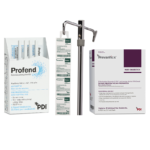Interventional Care


We notice that you are visiting us from . This site only services US-based visitors. Would you like to visit the site that is appropriate for your location?

We all recognize the importance of compatibility in the people we surround ourselves with. From your spouse to your friends to your co-workers, life is better when your relationships exist without constant problems or conflict. But have you ever considered compatibility when it comes to your surface disinfectant?
I know what you’re thinking. I don’t often get into arguments with my disinfectant wipes. But it’s quite possible your equipment might.
Surface compatibility
Just because it’s an EPA-approved disinfectant with the dentistry required EPA registered TB, Hep B, and HIV kill claim doesn’t necessarily mean it’s “approved” by your equipment. Manufacturers are starting to put recommended classes of disinfectants in their instructions for use (IFU). Some disinfectants can cause that expensive technology to discolor, crack, or even break.
It’s a delicate dance to look at all your equipment and pick the best product based on varying recommendations. It might have you tempted to have an array of choices for your team. But mixing disinfectants can have detrimental effects on your equipment and patient care.
Equipment
I recently saw a two-year-old X-ray head that was cracking and dropping pieces of plastic onto patients like flakes of dandruff on a black shirt. After some investigation, it was determined that the office had a habit of using whatever disinfectant was on sale. While this might seem like a great way to save money, it turned into an expensive lesson in chemistry.
Choosing one compatible disinfectant and sticking with it has many benefits, but the first one is preserving the longevity of your equipment. If, through your investigation of IFUs, you determine it’s time to switch products, be sure to give your equipment a light soap and water bath to remove the residue that each product leaves behind. Otherwise, you could end up with an unplanned purchase.
Patient care
Recently, my husband had to have surgery. As we traversed the hospital from radiology to hematology to the surgeon’s consult area, I noticed each unit had a different disinfectant wipe. I couldn’t help but wonder if everyone in the hospital knew each product’s kill time, proper PPE, and surface compatibility. I started to get concerned about infection control compliance across departments.
Imagine how confusing it would be to go from one operatory or even one office to another to find different products with varying kill times. Not only could this slow down care if a clinician took the time to read the proper use of the product, but imagine they didn’t, and the operatory wasn’t properly disinfected.
Loyalty has its perks.
We are all looking for ways to make our day a little bit easier. Choosing to work with a company that has a wide portfolio of compatible disinfectants can give you leverage to take advantage of sales, perks, and bonus deals—saving you money, prolonging the life of your equipment, and eliminating team confusion that can lead to infection control breaches.